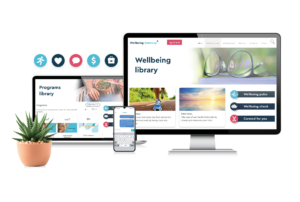But true wellness isn’t about chasing fads—it’s about finding balance, fuelling your body with a variety of nourishing foods, and embracing a positive, flexible approach to healthy living.
Nutrition is a key factor in our overall health and wellbeing but it’s not about perfection, it’s about fuelling your body and mind to feel your best.
Where do I start?
It’s important to eat a balanced diet to get all the nutrients your body needs to keep you feeling your best.
This starts with building a balanced plate at each meal.
To do this, it helps to understand what the different food groups do for your body.
Carbohydrates
Carbohydrates are the main source of energy for your body.
They are found in whole grains, fruits, vegetables, and legumes.
Proteins
Proteins are essential for building and repairing muscle and tissues.
High protein foods include lean meats, eggs, dairy, tofu, legumes, and nuts.
Fats
Fats support brain health, hormone production, and cell function.
Healthy fats are unsaturated fats and are found in foods like avocados, olive oil, nuts, seeds, and fatty fish.
In comparison, unhealthy fats found in highly processed foods, and some animals products can increase your risk of heart disease and other chronic health conditions.
Vitamins and minerals
Vitamins and minerals are found in fruits, vegetables, and whole foods.
They support immune function, bone health, and energy production, and generally help your cells and organs perform at their optimal levels.
Water
Water is vital for every system in your body. Staying hydrated helps with digestion, energy, and mental clarity.
Three top tips for eating balanced diet
1. Eat the rainbow
Aim to include a variety of colourful fruits and vegetables in each meal.
Phytonutrients are natural compounds found in plants that can help protect against disease and support overall health.
Each group of fruits and vegetables is associated with different phytonutrients, so eating a rainbow of colours ensures you’re getting a diverse mix of antioxidants and nutrients to promote optimal wellness.
For example, orange fruits and vegetables are rich in beta-carotene, a nutrient that supports vision and may help reduce inflammation.
While green cruciferous vegetables contain compounds like sulforaphane, which may help neutralise carcinogens—also known as ‘cancer-blocking’ chemicals.
2. Build a balanced plate
Build a balanced plate.
As well as your rainbow fruits and vegetables, try to include a mix of carbohydrates, protein, and healthy fats in each meal.
This will help to stabilise blood sugar and give you a sustained energy release over a longer period, and keep you full longer.
Where possible, reduce your intake of highly processed foods that have additives and high sugar and unhealthy fat contents.
3. Eat mindfully
Where possible, eat with other people and avoid standing to eat, or eating in front of the TV.
Slow down, savour your food, focus on what you are eating, and listen to your body’s hunger and fullness cues.
This will help to build a healthier relationship with food.
The information contained in this article is for educational and informational purposes only and is not intended as health, medical or financial advice. Always consult a qualified health provider with any questions you may have regarding your health or a medical condition.
Something on your mind?
If you require counselling, coaching or support, our clinicians are available to help. Call, chat or request an appointment online.
Looking for more resources?
Register for Wellbeing Gateway. Your personalised mental health and wellbeing companion.

